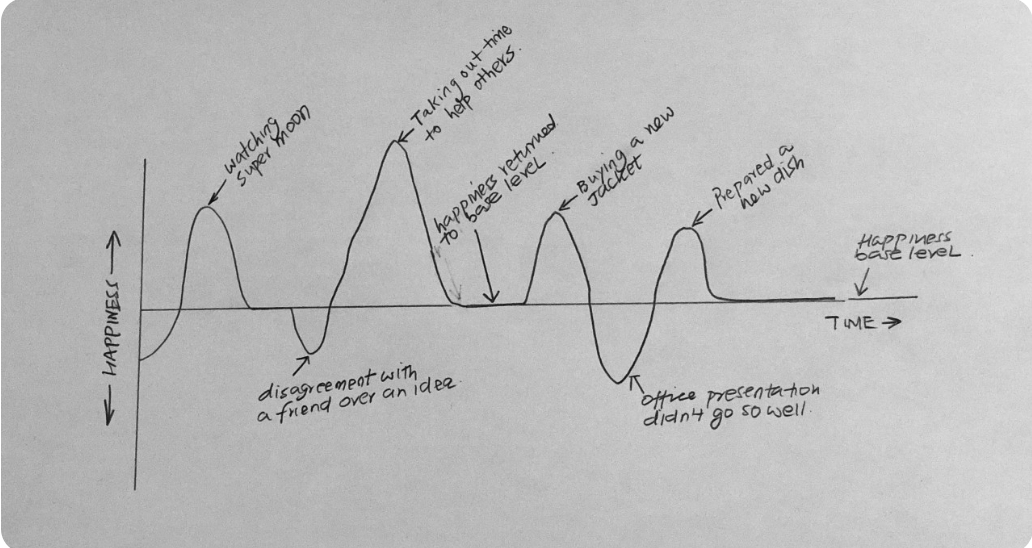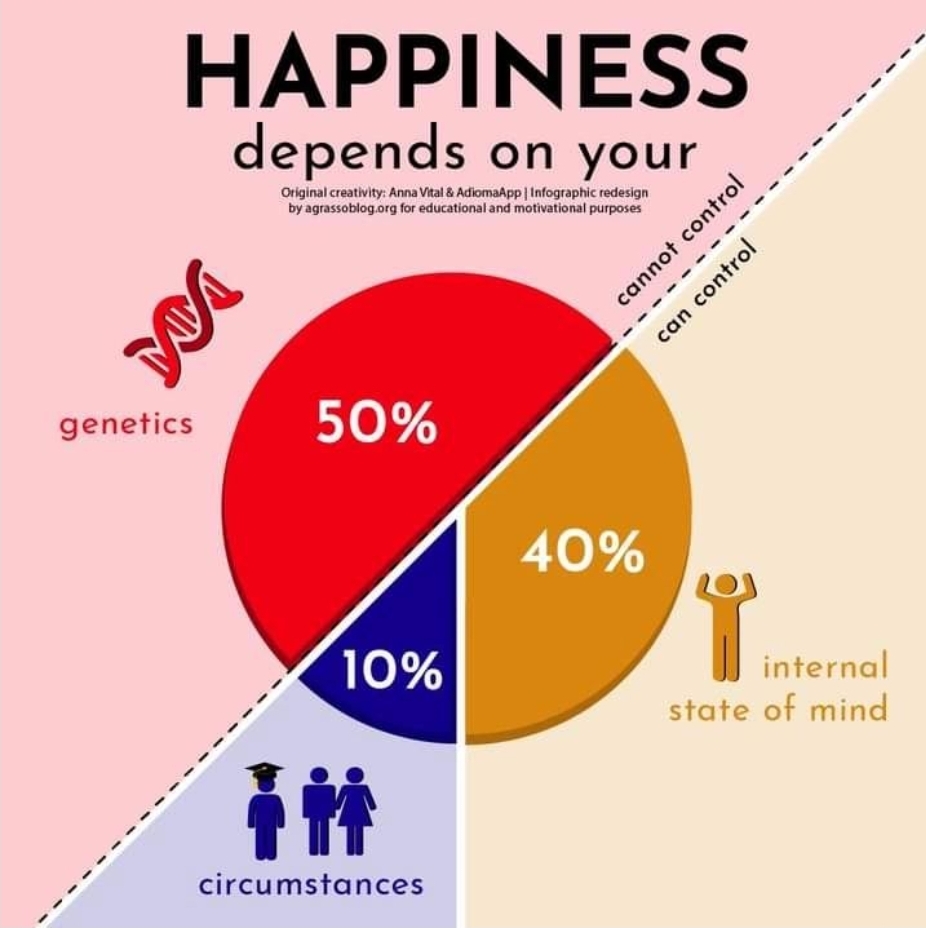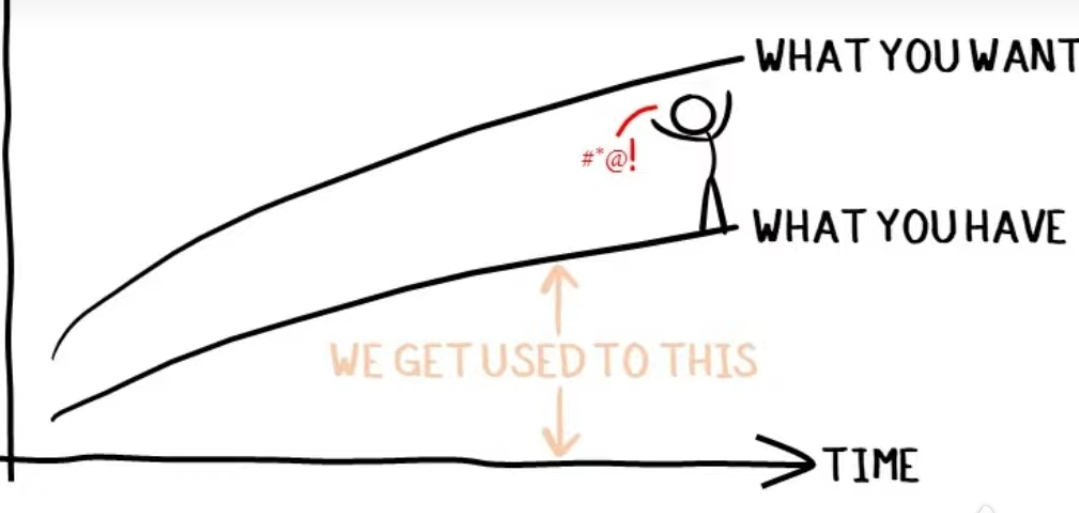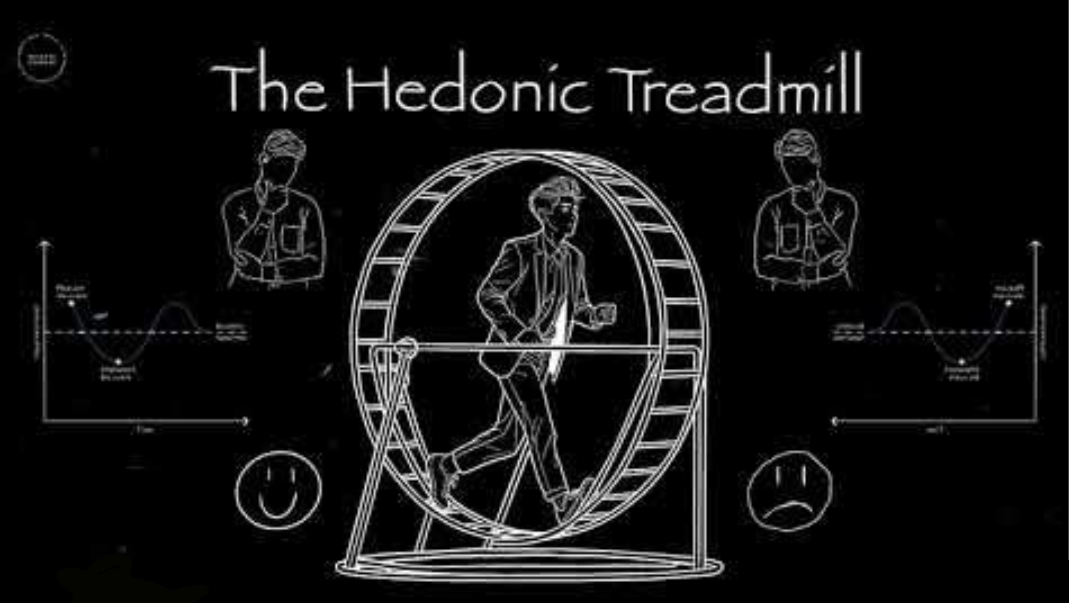The concept of the hedonic treadmill and hedonic adaptation provides a profound framework for understanding human happiness and how it relates to our expectations, choices, and circumstances.
“In Happiness Hypothesis, Jonathan Haidt says this keeps us stuck on the hedonic treadmill “On an exercise treadmill you can increase the speed all you want, but you stay in the same place. In life, you can work as hard as you want, and accumulate all the riches, fruit trees, and concubines you want, but you can’t get ahead. Because you can’t change your “natural and usual state of tranquility,” the riches you accumulate will just raise your expectations and leave you no better off than you were before. Yet, not realizing the futility of our efforts, we continue to strive, all the while doing things that help us win at the game of life. Always wanting more than we have, we run and run and run, like hamsters on a wheel.” (1)
At its core, it illustrates how we tend to adapt to changes—both positive and negative—quickly, returning to a baseline level of happiness.

This dynamic can deeply influence how we approach life, relationships, possessions, and even our values like family, faith, and nation.

The Baseline of Happiness
Research suggests that an individual’s happiness baseline is influenced by three factors:
50% Genetics:
- This component is inherited from our parents and determines our predisposition to happiness or positivity.
- For example, some people naturally possess a sunny disposition, while others are more prone to melancholy.
10% Life Circumstances:
- External factors like wealth, health, relationships, and significant life events contribute to this portion.
- While impactful in the short term, circumstances only account for a small portion of long-term happiness because of hedonic adaptation.
40% Personal Control:
- This represents the largest area of potential growth and influence. It includes intentional activities like practicing gratitude, maintaining a positive mindset, building meaningful relationships, and aligning actions with values.
Hedonic Adaptation and Gratitude
Hedonic adaptation explains why we often lose appreciation for things we once desperately wanted. For instance:
- Milestones: We eagerly anticipate life events like getting a driver’s license, owning a car, or starting a family. Once achieved, the novelty wears off, and they become part of our routine.
- Material Goods: Buying a new car or going on a shopping spree can bring a temporary dopamine boost, but over time, these items lose their emotional significance.
- Relationships: The excitement of new love or marriage can fade into the background of daily life if not actively nurtured.

The key to countering this cycle is gratitude:
- Being mindful and appreciative of what we have prevents us from taking it for granted.
- By focusing on the value and meaning of our possessions, relationships, and achievements, we can break free from the constant pursuit of “more.”
40%: Personal Control and the Mindset Shift
Your 40% personal control is the most powerful tool you have to shape your happiness. Here’s how you can strengthen it:
Adopt a Positive Mindset:
- As Viktor Frankl teaches, your greatest freedom is the ability to choose your attitude.
“Our greatest freedom is the freedom to choose our attitude.” — Victor E. Frankl
- Reframe problems as opportunities for growth. For example, challenges in relationships or work can become lessons in patience, resilience, and adaptability.
Practice Gratitude:
- Gratitude shifts focus from what is lacking to what is present. Keeping a gratitude journal or daily reflection can help anchor appreciation for life’s blessings.
Cultivate Awareness:
- Be present in the moment. Savoring experiences rather than rushing through them fosters lasting happiness.
- Recognize and challenge negative thought patterns, replacing them with constructive perspectives.
Focus on Core Values:
- Prioritize what truly matters: God, family, and country. Aligning your life with these values creates a deeper sense of purpose and fulfillment.
Strengthen Emotional Resilience:
- Develop habits like mindfulness, prayer, or meditation to navigate adversity without being consumed by it.
- Building resilience empowers you to handle life circumstances (the 10%) without letting them dominate your happiness.
The Dangers of Weak Personal Control
When the 40% personal control is weak:
- The 10% life circumstances become overwhelming. Tragic events, financial struggles, or health issues may feel insurmountable.
- Individuals may feel trapped by their genetics, blaming their DNA or circumstances instead of taking proactive steps to improve their outlook.
Strengthening this 40% allows individuals to reclaim power over their happiness, ensuring that external circumstances and internal predispositions don’t dictate their lives.
Why the Hedonic Treadmill Matters
Appreciation Over Accumulation:
- Instead of constantly seeking new possessions or experiences to fill the void, we can appreciate the ones we already have.
- This mindset prevents the cycle of dissatisfaction that comes from hedonic adaptation.
Sustaining Relationships:
- In relationships, the hedonic treadmill often manifests as neglect or boredom over time. Regularly expressing gratitude and investing effort into these relationships keeps them meaningful and fulfilling.
Finding Contentment in Simplicity:
- By focusing on what truly matters—faith, family, and purpose—we can escape the endless pursuit of fleeting happiness.
- Contentment arises not from having more but from valuing what we have.
Applying This in Life
Mindset of Gratitude and Awareness:
- Pause to reflect on the blessings in your life. Think about the family, faith, or freedoms you might have taken for granted.
- Recognize that many things you once wished for are now part of your daily reality—celebrate this progress.
Strengthen the 40% Through Discipline:
- Build habits that support mental and emotional well-being, like journaling, exercising, or spending quality time with loved ones.
- Avoid distractions like constant comparison or the need for validation, which can weaken personal control.
Anchor Happiness in Values:
- Pursue activities and relationships aligned with your core principles of God, family, and country.
- Let these values guide decisions, ensuring your efforts are meaningful and fulfilling.
Key Takeaways
- The hedonic treadmill teaches us that happiness is fleeting unless we actively nurture it through awareness, gratitude, and intentional living.
- While genetics (50%) and circumstances (10%) play a role, your 40% personal control gives you the power to shape your happiness and resilience.
- By focusing on what truly matters and appreciating the present, you can step off the treadmill of constant striving and find deeper, lasting fulfillment.
“Everything can be taken from a man but one thing: the last of the human freedoms-to choose one’ S attitude inany given set of circumstances, to choose one’s own way.” — Viktor E. Frankl
As Viktor Frankl reminds us, the greatest freedom lies in choosing your attitude. By cultivating gratitude, strengthening personal discipline, and aligning with core values, you can create a life of purpose and joy, no matter the circumstances.







